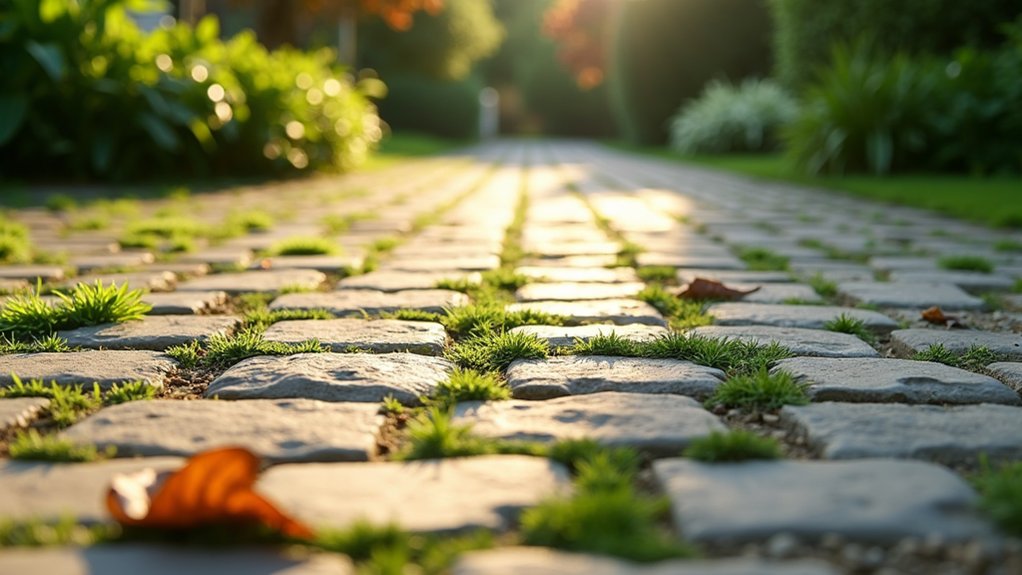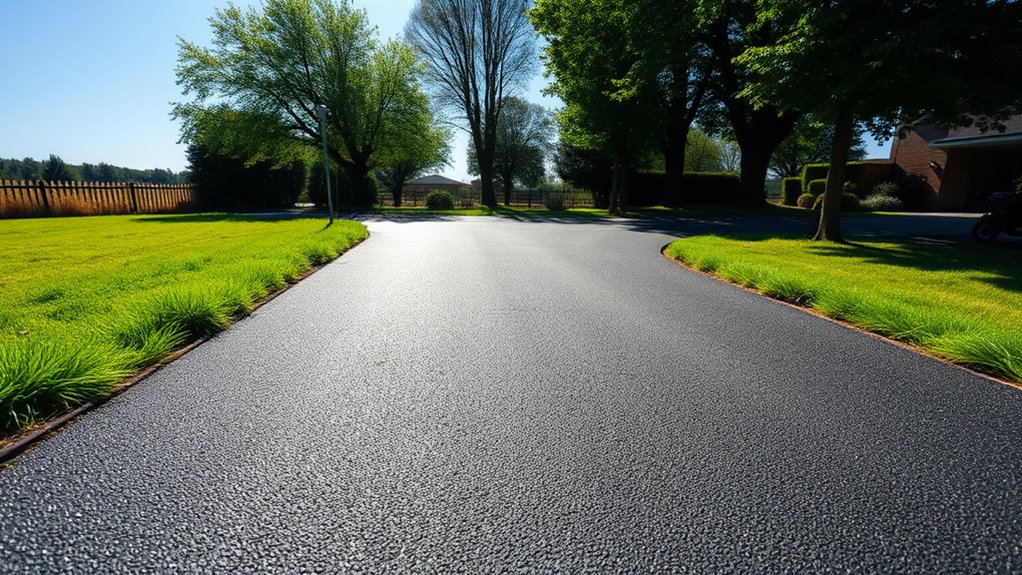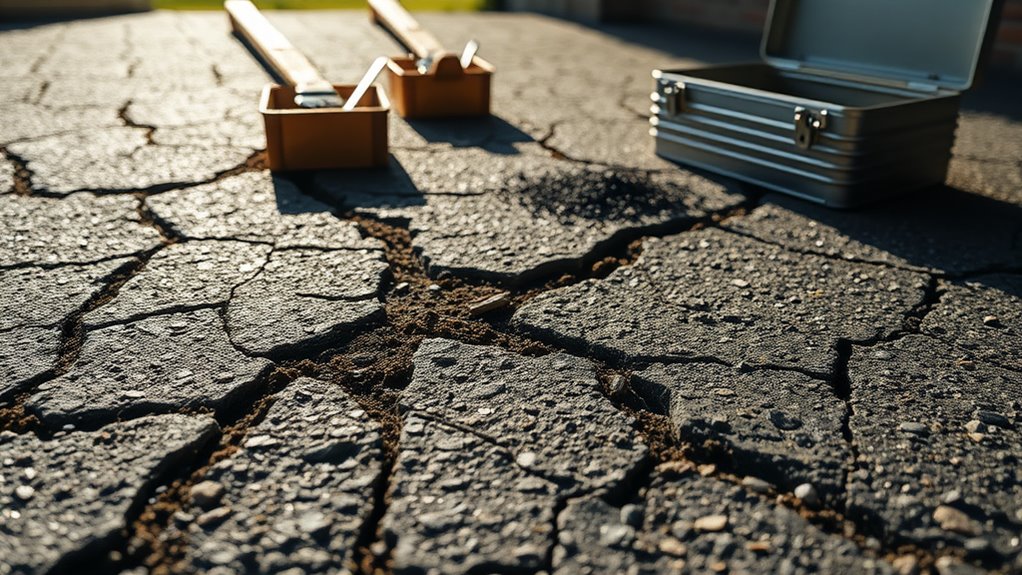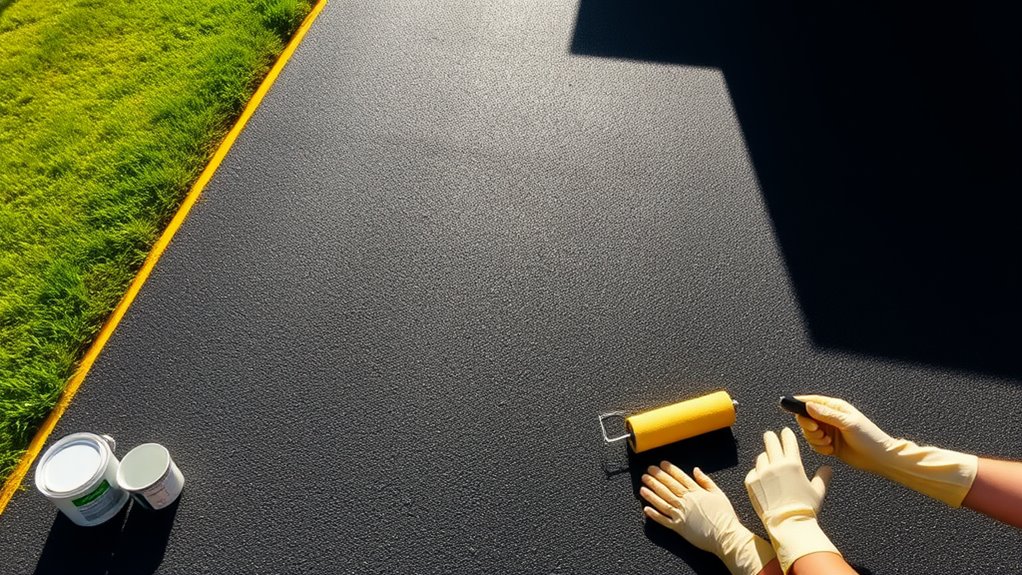Permeable driveways can last between 20 to 30 years if they are installed and maintained correctly. Their durability relies on factors such as the quality of materials, installation techniques, and local weather conditions. Regular maintenance, like vacuuming twice a year and clearing away debris, is essential to prevent blockages and prolong their lifespan. Additionally, soil stability and climate can influence performance, so choosing the right installation method is crucial. For tips on enhancing durability and efficiency, consider looking into more detailed resources.
Table of Contents
ToggleKey Takeaways
Permeable driveways can last between 20 to 30 years when made with high-quality materials and maintained properly, although this can vary based on installation methods and local conditions.
To extend the life of your permeable driveway, regular maintenance is essential. This includes vacuuming twice a year and removing debris weekly.
Environmental factors, such as freeze-thaw cycles and heavy rain, can affect durability, so it’s wise to conduct regular inspections.
Using proper installation techniques and ensuring soil stability will greatly improve the driveway’s durability and load-bearing capacity.
Additionally, permeable driveways can save you money in the long run, as they reduce stormwater management costs and lower repair expenses, making them a smart financial choice.
Understanding the Durability of Permeable Driveways
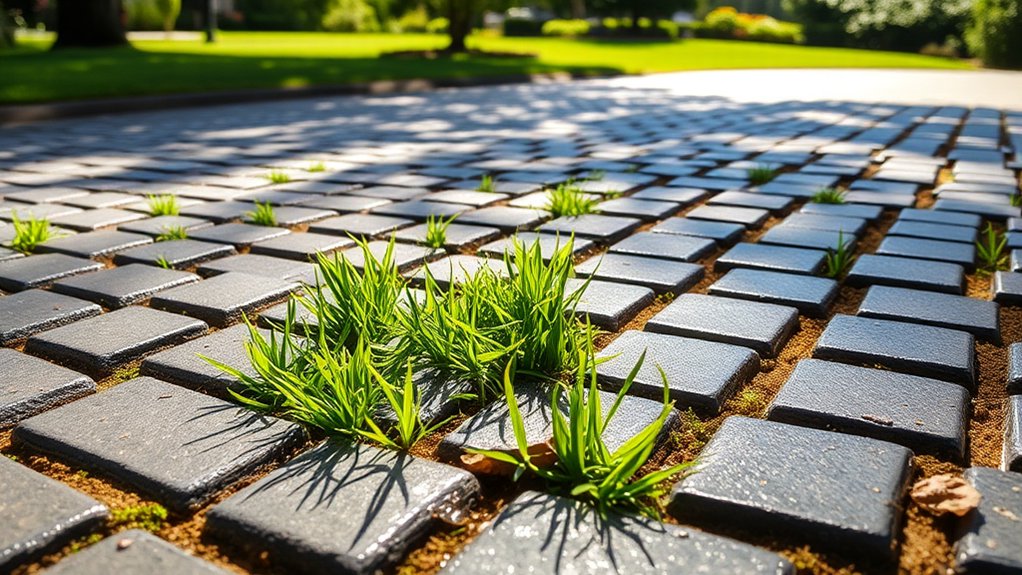
When assessing the durability of permeable driveways, it’s crucial to consider the materials and factors that impact their lifespan. Options like concrete pavers and pervious concrete can last between 20 to 30 years with proper maintenance. The installation method is vital; using poor techniques can lead to early failure, even with quality materials. For example, plastic grids can support heavy loads if fitted correctly, but inadequate soil conditions can undermine their stability. Additionally, considering the traffic load and weather variations is important, as these directly influence durability. By prioritising high-quality materials and effective installation, you can significantly extend the lifespan of your permeable driveway. Permeable paving can also infiltrate 70% to 80% of annual rainfall, contributing to its overall durability. Moreover, understanding the maintenance requirements for different types of permeable surfaces ensures that they continue to function effectively over time.
Functional Longevity and Performance Factors
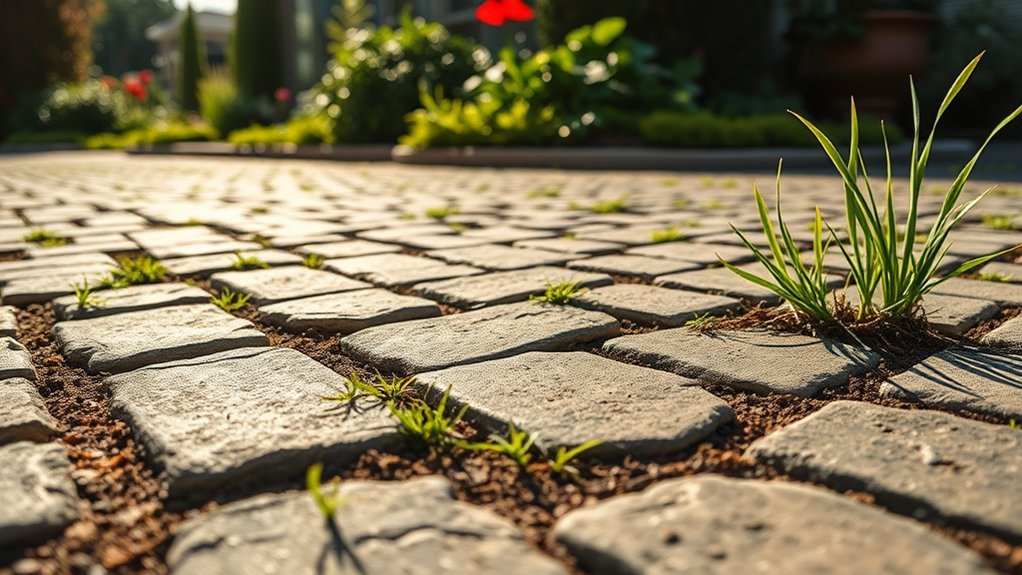
The longevity of permeable driveways depends on several key performance factors that affect their durability. Firstly, the choice of materials is crucial; options like concrete, plastic grids, and permeable block paving each have their own strengths. The main materials for permeable pavers include concrete, brick, and natural stone, which can significantly impact both durability and aesthetics. The driveway also needs to endure local weather conditions, especially freeze-thaw cycles, which can weaken its structure. Proper installation is vital, as poor workmanship can lead to early failure. Good water filtration is important too, as it helps prevent blockages and ensures effective drainage. Additionally, it’s essential to consider the driveway’s load capacity to ensure that it can support vehicle traffic without sustaining damage. All these factors work together to enhance a permeable driveway’s resilience, allowing it to function well while providing environmental advantages. Moreover, regular maintenance, including sweeping or vacuuming, helps preserve the driveway’s integrity and enhances its overall performance.
The Role of Maintenance in Extending Lifespan
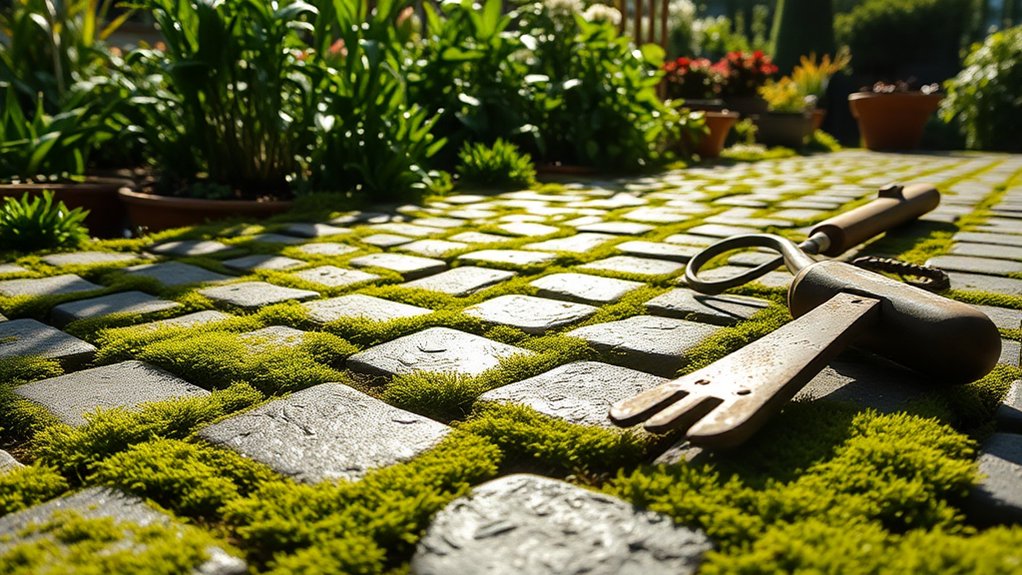
Neglecting maintenance can lead to significant deterioration, so regular upkeep of permeable driveways is essential for extending their lifespan. Aim for biannual vacuuming with a powerful shop vacuum and weekly debris removal to improve performance. Use straightforward cleaning methods like broom sweeping and leaf blowers to clear surface debris, and consider power washing for stubborn clogs, but take care not to damage the pavers. After heavy rainfall, conduct regular inspections to spot pooling water and potential blockages, allowing you to tackle issues early. Periodic vacuuming is vital to prevent sediment from entering the stone base and soil subgrade, ensuring the longevity of the driveway. Maintaining the surface also enhances its drainage effectiveness, further contributing to the driveway’s durability.
Environmental and Climatic Influences on Durability
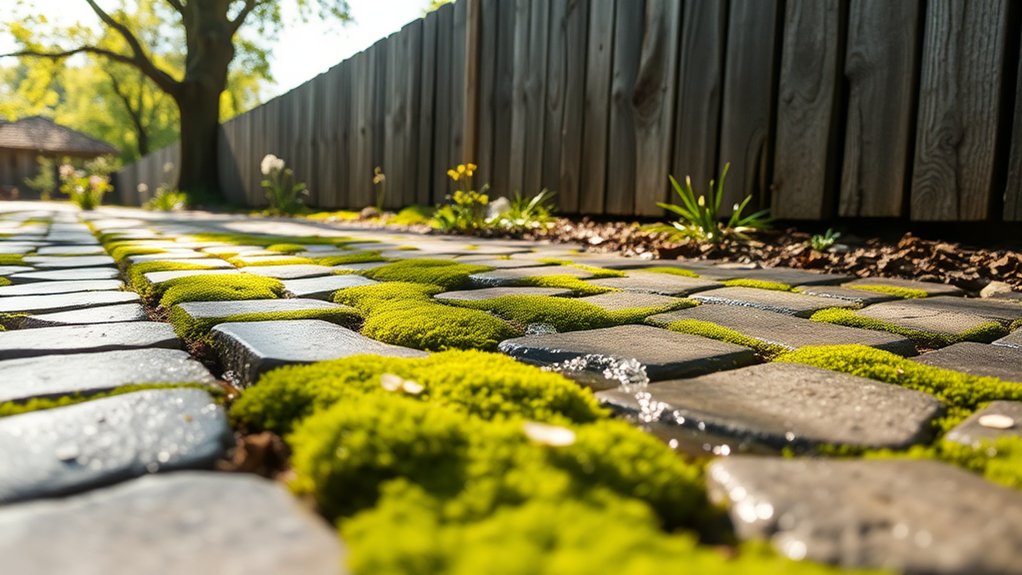
The durability of permeable driveways can vary significantly due to different environmental and climatic conditions. Factors such as soil stability and local climate play a crucial role in their performance. For example, extreme weather events can weaken the structure, while overgrown vegetation may impede proper drainage.
| Environmental Factor | Impact on Durability |
|---|---|
| Freezing Temperatures | Freeze-thaw cycles can damage materials |
| Heavy Rainfall | Improves stormwater management |
| Soil Saturation | Unstable soil can lead to structural issues |
Being aware of these factors is essential for making informed choices about installation and upkeep. In areas with notable temperature changes, it’s vital to keep an eye on soil stability. By addressing these environmental concerns, you can significantly extend the life of your permeable driveway.
Structural Versatility and Resilience Considerations
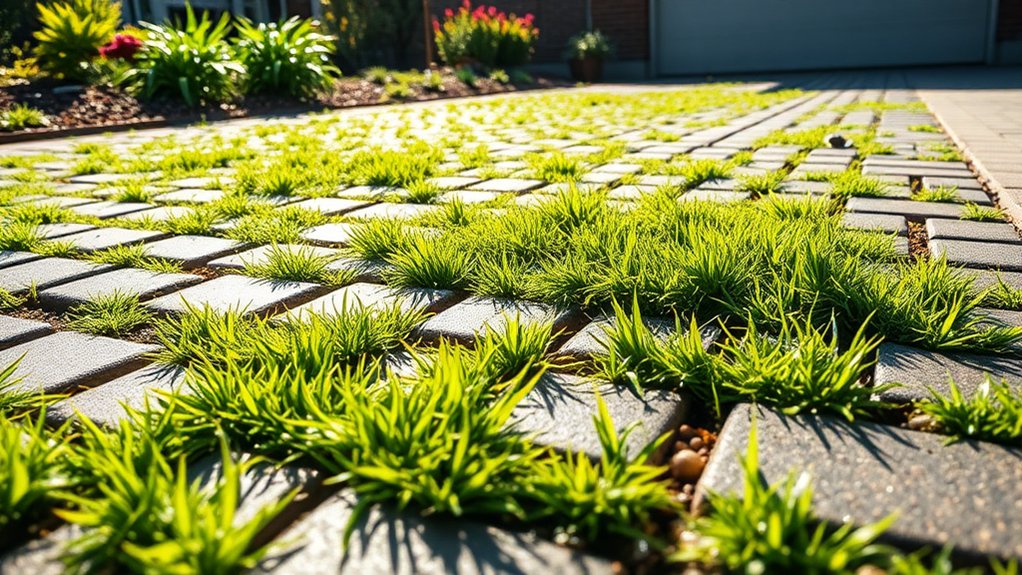
When designing permeable driveways, it’s essential to consider their structural versatility and resilience to varying loads and traffic conditions. A well-constructed permeable pavement can effectively distribute weight, minimising stress across the surface.
Choosing durable materials, like permeable concrete or porous asphalt, ensures the driveway can endure both traffic and environmental factors. Proper compaction during installation is vital to balance permeability with structural strength, preventing early damage.
Factoring in expected traffic volume during the design phase can also enhance the driveway’s longevity, ensuring it performs well under different conditions. Regular maintenance will help preserve both functionality and appearance over time.
Economic Benefits of Permeable Driveways
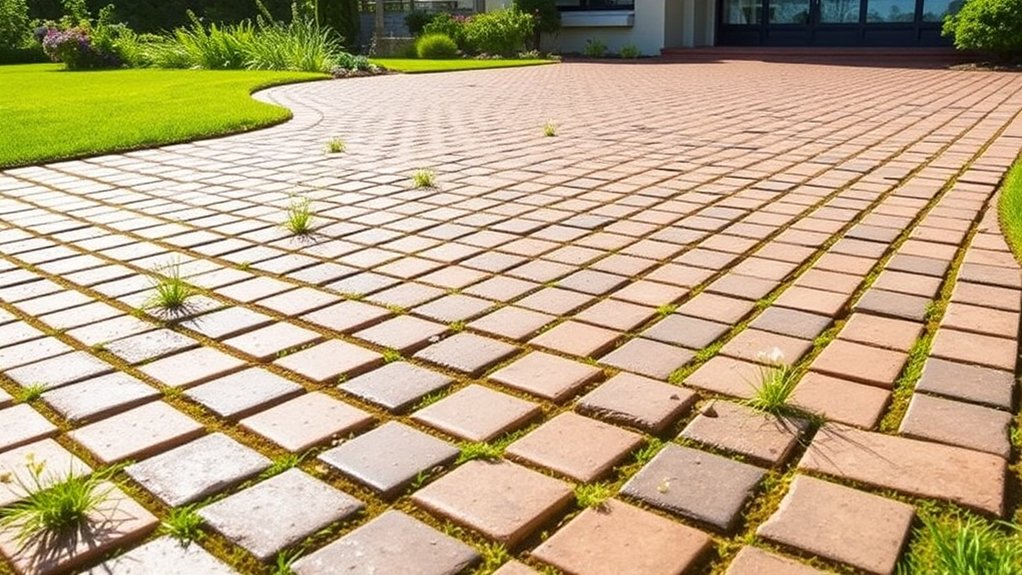
When considering permeable driveways, the long-term savings are clear.
They require less maintenance and are more durable, which means lower costs for repairs and replacements over time.
Furthermore, this eco-friendly investment can boost your property’s value and lighten your financial load overall.
For example, instead of frequently replacing traditional driveways, you could invest in a permeable option that pays off in the long run.
Long-Term Cost Savings
While permeable driveways might’ve higher initial installation costs compared to traditional options, they offer significant long-term savings for homeowners.
Here are some key economic benefits to consider:
- Reduced need for stormwater management infrastructure, leading to lower overall expenses.
- Decreased detention requirements can help offset some of the initial costs.
- Increased property value due to eco-friendly features, which can enhance resale potential.
- Lower repair costs over time, thanks to durable materials.
- Potential tax benefits or rebates in areas that promote sustainable practices.
These factors show that although the upfront investment may be higher, the long-term savings associated with permeable driveways make them a wise choice.
Balancing initial costs with future benefits can lead to considerable economic advantages.
Reduced Maintenance Expenses
Permeable driveways significantly lower maintenance costs, providing a budget-friendly option for homeowners in the long run. By allowing rainwater to filter through, these driveways reduce the need for expensive stormwater management systems.
You’ll find that they require less frequent maintenance compared to traditional surfaces, meaning you won’t have to seal or resurface them as often. This leads to considerable savings.
Moreover, the durability of permeable materials means fewer repairs and replacements, adding to your savings. You’ll also notice a decrease in the need for chemical treatments and pressure washing, which further cuts down on upkeep costs.
In short, permeable driveways offer economic benefits that enhance both your property’s functionality and its visual appeal.
Sustainable Investment Benefits
Investing in permeable driveways offers substantial sustainable benefits that go beyond looks. By selecting eco-friendly materials and incorporating green technologies, you’re not just improving your property but also making a wise financial choice.
Here are some key advantages:
- Reduced Infrastructure Costs: Less dependence on conventional stormwater systems.
- Increased Property Value: Enhances both visual appeal and environmental value, raising overall worth.
- Long-Term Savings: Cuts costs over time by minimising infrastructure requirements.
- Government Support: Eligibility for grants and tax relief for sustainable projects.
- Groundwater Recharge: Assists in alleviating drought effects, supporting ecological health.
These factors make permeable driveways a practical option for anyone seeking sustainable investments while enjoying financial benefits.
Frequently Asked Questions
Can Permeable Driveways Handle Heavy Vehicle Traffic?
Permeable driveways can accommodate heavy vehicle traffic if designed with the right load-bearing capacity and traffic management in mind. Choosing the correct base thickness and materials is essential for ensuring they can withstand frequent heavy loads without failure. For example, a well-constructed permeable driveway can support delivery vans or larger vehicles, provided it’s properly engineered.
What Materials Are Used in Permeable Driveway Construction?
When building permeable driveways, gravel pavers and porous asphalt are commonly used materials. Gravel pavers offer both stability and drainage, while porous asphalt provides strength along with permeability, making them excellent options for managing water effectively.
Are Permeable Driveways Suitable for All Climates?
“Don’t put all your eggs in one basket.” Permeable driveways can adapt well to moderate climates, allowing for effective drainage. However, in areas with extreme temperature changes, their performance may be compromised. For instance, excessive frost can damage the materials, so it’s crucial to choose the right type for your local conditions when installing.
How Do Permeable Driveways Affect Local Wildlife?
Permeable driveways can benefit local wildlife by improving water drainage and filtration, helping to keep water sources cleaner. However, it’s important to plan their placement carefully, as they can also fragment habitats and hinder wildlife movement in urban areas. For instance, a permeable driveway in a suburban garden might allow rainwater to seep away, but if it cuts off a natural corridor for hedgehogs, it could create barriers for these creatures. Balancing these factors is key to supporting wildlife while enjoying the advantages of permeable surfaces.
Can I Install a Permeable Driveway Myself?
Yes, you can install a permeable driveway yourself. With careful planning and a clear budget, the process can be straightforward. Just ensure you have the necessary tools and adhere to the guidelines for a successful installation. For example, using permeable paving blocks can help with drainage and prevent puddles. Stick to the basics, and you’ll be on your way to a functional driveway.
Conclusion
In the realm of driveways, permeable surfaces are like sturdy trees, resilient against the elements. Their durability largely depends on regular maintenance, akin to a gardener caring for plants. Environmental factors, such as weather conditions, also influence their lifespan. By understanding these aspects, you can maintain a driveway that looks good and works well. Choosing a permeable driveway not only enhances your property but also contributes to a sustainable environment, leaving a positive mark on both your home and the planet.
Maximize the durability of your tarmac driveway by understanding the ideal weather conditions for installation—discover the secrets to perfect timing Read more
Discover the common causes of tarmac driveway cracks and learn effective repair methods to protect your investment—your driveway deserves the Read more
Before you paint your tarmac driveway, discover essential tips and techniques that can transform its appearance and durability—don't miss out Read more

